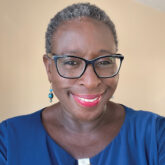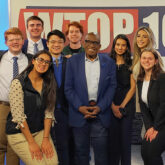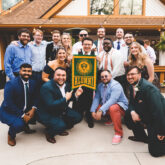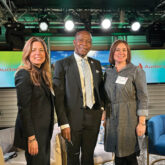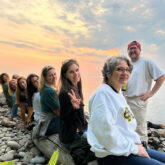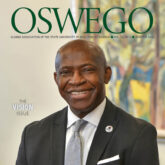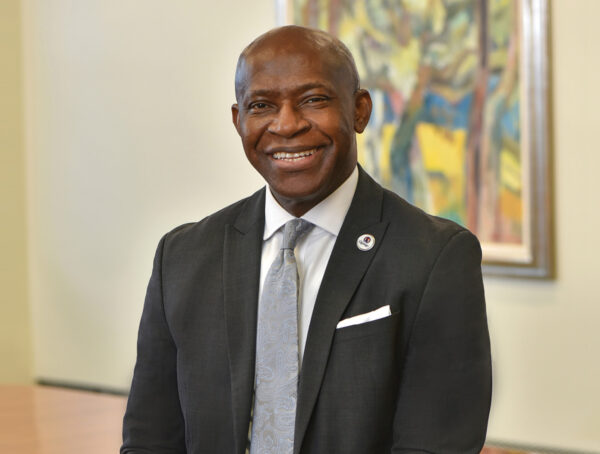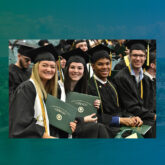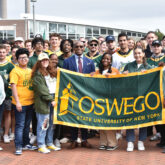When Marianne Matuzic Myles ’75 left her home near Buffalo to come to Oswego after high school, she was “a bit scared as all freshmen are” of moving so far from home and not knowing anyone.The journey she embarked upon that day in 1971 would be just the first step of a lifelong adventure that would take her literally around the globe as a U.S. ambassador.
In a career spanning more than three decades, Myles would represent the United States in Italy, Colombia, Uruguay and most recently, the Republic of Cape Verde, just off the west coast of Africa. She would negotiate a trade agreement that helped open China to the U. S. markets and control the embargo of goods to adversary nations.
The journey brought her full circle this spring when Myles, who is now dean of the State Department’s School of Language Studies in Washington, D.C., returned to campus as keynote speaker at Honors Convocation in April.
But it all began with that three-hour drive east on I-90 to a certain “friendly college” on the shores of Lake Ontario.

Marianne Matuzic Myles ’75 oversees 600 teachers and more than 2,000 students as dean of the Language School of the Foreign Service Institute in Washington, D.C.
A little bit of home made the transition more bearable. Myles was surprised to find a classmate from Mt. Mercy Academy, Patricia Weart ’75, living just a couple of doors down in Hart Hall. The two young women helped each other adjust to life on campus and eventually became roommates.
Myles’ formative international experience came in college. In her second year at Oswego she would study abroad in Madrid as part of Oswego’s Spanish program.
The late Richard Hyse, emeritus professor of economics, pointed Myles in the direction that would become her life’s work. He was her first economics teacher and sparked a passion in the young student looking for a major. Hyse’s course in comparative economic systems looked at the Soviet Union, China and other countries, and fueled a love of global economic policy that led Myles into the Foreign Service after crossing the stage in Laker Hall.
Jose Perez, who was the head of International Studies at Oswego in the 1970s, served as a mentor and counselor. “I am indebted to him as well,” Myles says. Through Perez, she met international students who impressed her with a motivation for learning so strong that they left their homes and traveled across the world for an American education.

Marianne Matuzic Myles ’75, right, received a Presidential Merit Award from President Barack Obama, for her service as the U.S. Ambassador to Cape Verde and other career accomplishments. It was presented by Secretary of State Hillary Rodham Clinton at a 2011 ceremony at the State Department.
In her senior year, Myles took the Foreign Service exam on a snowy winter’s day that almost discouraged her from making the drive to Syracuse. Just six months after graduation, she embarked on her new career, with her first assignment in Bogota, Colombia. She followed that with three years in Italy, working to open trade opportunities for American companies.
Another bit of Oswego experience served her well in the diplomatic corps. In Waterbury Hall, Myles spent hours learning to play bridge from fellow student and first husband, Peter Kunkel ’75, when she “should have been studying.” The game is played in many different places around the world, and the common bond of bridge helped her make new friends wherever she was posted during her career.
After earning a master’s in public administration at Harvard University, she represented the United States in Paris at a multilateral organization that controlled the export of high tech products to adversary countries that might use them in the manufacture of weapons. Her portfolio included semi-conductors, a fairly new technology at the time.
“I was scared as heck; I didn’t know anything about semiconductors,” she admits. “But I did a lot of research — being prepared is the key to being a leader.”
Myles learned all she could about the products and negotiated a deal protecting U. S. interests.
Later she would represent her country at the World Intellectual Property Organization in Geneva, a United Nations-based group that controls the patenting of products worldwide.
Learning to Learn
Myles attributes her ability to succeed in these assignments to her Oswego education. “What you learn in college is not so much the subject matter, but you learn how to learn,” Myles says. “We didn’t have Google then,” so research ability was key.
 The other thing she learned was being open to new experiences. “Whatever you are doing, you need to be constantly expanding your horizons,” she told students in classes during her spring visit to campus. “Be open to all kinds of possibilities and don’t freeze yourself in time.”
The other thing she learned was being open to new experiences. “Whatever you are doing, you need to be constantly expanding your horizons,” she told students in classes during her spring visit to campus. “Be open to all kinds of possibilities and don’t freeze yourself in time.”
Now Myles oversees 600 teachers and 2,000 students studying 70 languages at the Language School at the Foreign Service Institute in Washington. Foreign service officers attend the school to learn the languages they will need in their overseas postings.
While much of her international work dealt with trade on a massive scale, Myles found ways to positively impact the lives of people in the countries she visited. In Cape Verde, she was active in getting help to improve the daily lives of women and girls.
Many girls in that African country cannot attend school because uniforms are required and that is expensive. If a family must make a choice to outfit a boy or girl for school, they will choose the boy while the girl stays home.
Myles worked through a contact of her current husband, retired Foreign Service Officer Stan Myles, to secure a donation from a Texas philanthropist. She took the gift to a women’s co-op, which then purchased cloth and sewed the uniforms. Thus the benefit was two-fold: creating employment for women as well as helping girls attend school.
Because there is no water system in the rural parts of Cape Verde, girls had to haul water for the family morning and night. In one village, they would walk 11 kilometers (about seven miles) hauling heavy buckets and arrive at school exhausted and unable to focus on their studies. Myles neogiated with a non governmental organization, or NGO, for the money to drill a well and pipe water to the village so that the girls could spend their mornings getting ready for a productive day in class instead of hauling water. “That donation directly freed the girls to get a better education,” she says with a happy smile.
Secretary of State Hillary Rodham Clinton has made it her mission to focus in a special way on women’s issues, and she has encouraged ambassadors to be aware and try to bring about positive change for women.
One change in particular animates Myles as she discusses it. By bringing together all the embassies in Cape Verde led by women ambassadors — an impressive total of six out of 12 permanent embassies — as well as several professional Cape Verdean women, Myles was part of a movement to combat domestic violence in the country.
“There were no shelters for victims of domestic violence and perpetrators were usually not penalized — it was seen as a husband’s right to beat his wife,” she explains.
The group included some women jurists who agreed to craft legislation to protect victims of domestic violence. Through their efforts shelters are being created and offenders prosecuted.
A moment of satisfaction for Myles was when she saw on the news a high profile husband convicted of beating his wife being taken to jail.
“Women judges, lawyers, police officers, educators and private citizens came together in a commitment to make it all happen,” she says, pride evident on her face.
“Now hundreds, and eventually thousands, of women can feel empowered and protected, because now we have this law,” Myles adds.
“I’m jazzed by it.”
Myles has traveled to 85 countries, logged millions of miles in the air and on land, and affected the lives of thousands of people on four continents.And to think it all started with a journey of 150 miles down the Thruway to a little place called Oswego.
You might also like
More from Featured Content
Vision for the Future
VISION for the Future Peter O. Nwosu began his tenure as the 11th president of SUNY Oswego, building on the solid …
Envisioning the Potential in All Students
ENVISIONING the Potential in All Students Educator donates $2 million in recognition of his Oswego education, in support of future teachers Frank …
A Vision of Support
A VISION of Support Award-winning principal makes an impact on her school through her positivity and commitment When Nicole Knapp Ey ’02 …

